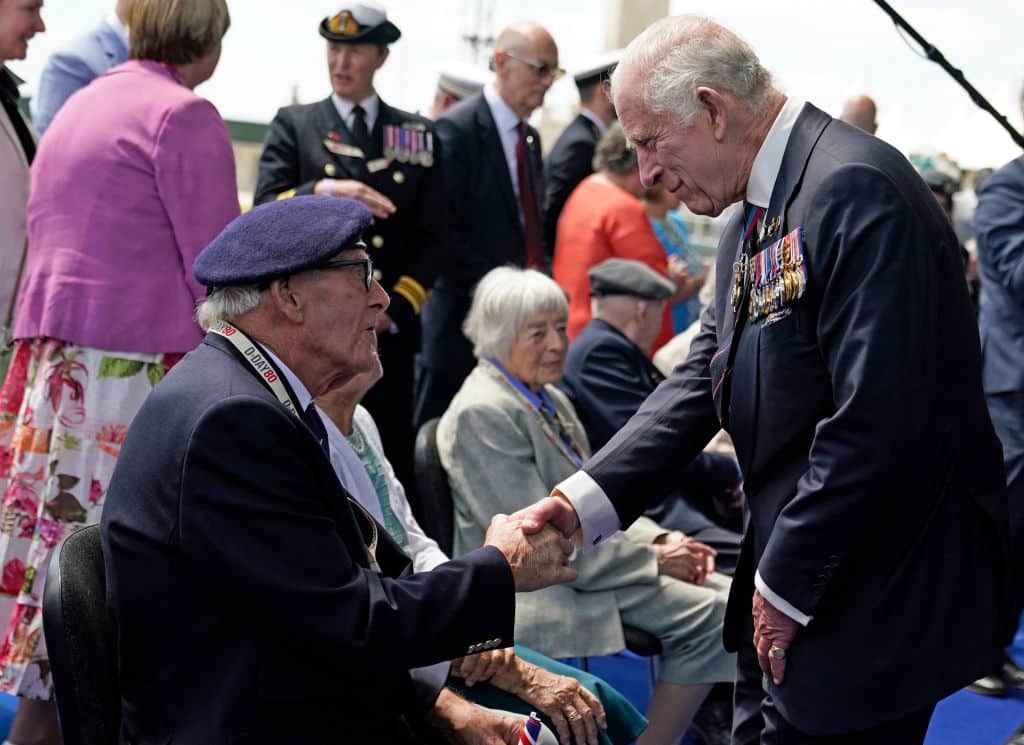<em>I sit in one of the dives</em>
<em> On Fifty-second Street</em>
<em>Uncertain and afraid</em>
<em>As the clever hopes expire</em>
<em>Of a low dishonest decade..."</em>
So begins WH Auden’s damning poem “September 1,1939”, written soon after German tanks rolled into Poland. I have been thinking about it a lot lately, marvelling at its masterly structure, at the poet’s intellect, wondering why he later turned away from it, and coming back again and again to the phrase “a low dishonest decade”.
It sits with me, heavy and oppressive, like one of Churchill’s black dogs. As the 80th anniversary of D-Day approaches, Auden’s words have never felt more pertinent, or more prescient.
I will soon be sitting on the bluffs above Omaha Beach with my 10-year-old son. We plan to visit the beaches and walk from the shoreline up to the emplacements of the Nazi guns, remembering the many, many men who died so we could feel the sun on our face and the wind in our hair.
My son is excited and a little apprehensive; I am, increasingly, “uncertain and afraid”. For here we are at the end of another“low dishonest decade”, the reckoning for which may prove to be of even greater enormity than that which met the boys who stumbled off the landing craft at daybreak on June 6,1944.
A decade ago, I watched the 70th anniversary commemorations with my first-born son in my arms. A number of elderly veterans had made the pilgrimage to Normandy for what would be the final time. I tried to focus on them and their sacrifice in an attempt to stave off the looming horror of the post-natal depression that was in the process of engulfing me. It didn’t work. I felt ashamed that I couldn’t shift my mood by focusing on what they had endured instead of the slow car crash going on inside my head.
And I felt so dislocated, completely out of things. I couldn’t settle to the waiting-in-the-wings that is necessary when one has a baby. “Take each day at a time,” the nurses kept saying. While my son slept I busied myself by filling in a baby book. Alongside the practical details; weight, time of delivery, family tree, there was a section to fill in about world events that happened around the time of his birth.
“President Putin annexed Crimea,” I wrote. “No one seems to be doing anything about it.” Later, “a plane has come down in mysterious circumstances over eastern Ukraine”. No mystery, as it turned out: a trial in absentia would convict Russian forces.
For years I had worked in frenetic, 24-hour newsrooms. Before I got married, I moved into the more family-friendly world of magazines. Now I watched cataclysmic events unfold several times removed, sitting on the sofa during the long, lonely hours when my husband was at work, surrounded by wet wipes and bottles of formula milk.
Why was no one doing anything? I wanted to know. Why? Why? Why?“The enlightenment driven away,” Auden continued. “The habit-forming pain, Mismanagement and grief: we must suffer them all again.” By the time Putin invaded the rest of Ukraine, my son was old enough for a subscription to The Week Junior.
Over breakfast, I’d field questions like, “Are we going to fight in this war, Mummy?” and “Can’t we just drop a massive bomb on Russia?” And now my sweet boy is 10 and has stopped asking questions about Ukraine or when Polina, our teenage babysitter who lodges with her mother in the next village, will be able to go home.
And I have watched with horror and impotent rage as Republicans repeatedly blocked the US aid package and the Pope suggested that Ukraine should capitulate to its aggressor, to have “the courage of the white flat and negotiate”.
And when the American aid dries up and –as seems likely –we have a hostile Trump back in the White House, what then? How I wish that Auden were here to make sense of it; Orwell, too. “Anyone able to read a map knows that we are in deadly danger,” he wrote in The Lion and the Unicorn(1940), in which he lambasted those who’d allowed Hitler’s deranged vision to go unchecked –“people utterly unable to grasp what age they are living in or what enemy they are fighting”.
“All I have is a voice / To undo the folded lie,” declared Auden. But when he reprinted the poem in a collection of 1945, he took out this stanza, which ends with the famous line, “We must love one another or die.”
He only allowed the poem to be reprinted once more, declaring that he considered it “trash”. Was he embarrassed by what he came to feel were the saccharine sentiments of that line? A shame, if so. It reminds me of 1 Corinthians, of the faith, hope and love that abide; “and the greatest of these is love”.
Like countless other couples, we chose it as a reading at our wedding. When I sit in the bluffs above the beach, I plan to smoke a Lucky Strike in tribute to the fallen and say thank you. I will pray for a less dishonest decade, for leaders who do not see through a glass, darkly. And I will hold my son close and vow to live and love as fiercely –and as honestly –as I possibly can.
<em>(King Charles III talks with D-Day veteran Eric Bateman, following the UK's national commemorative event to mark the 80th anniversary commemorations of the D-Day Landings | Photo by Andrew Matthews / POOL / AFP via Getty Images)</em>



